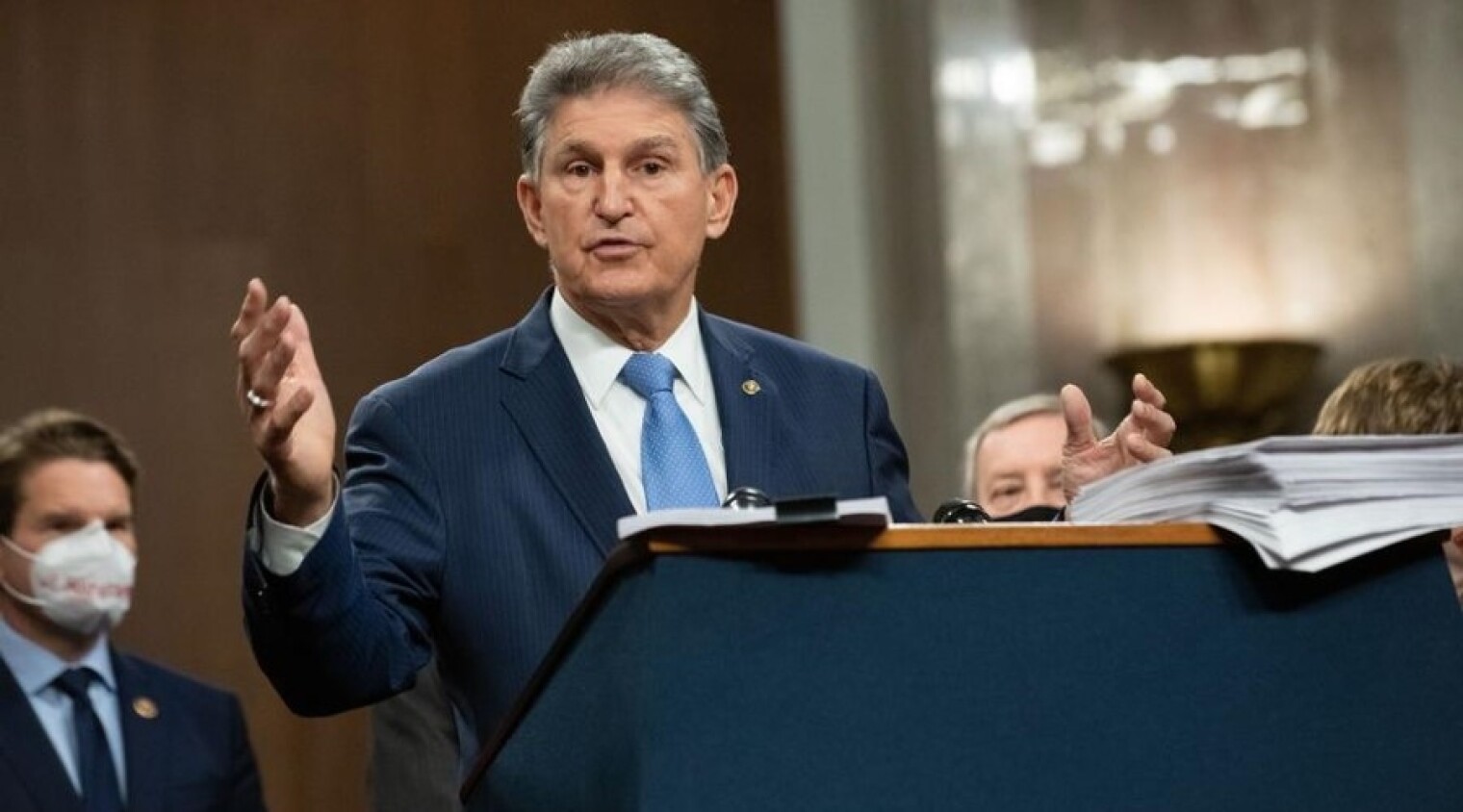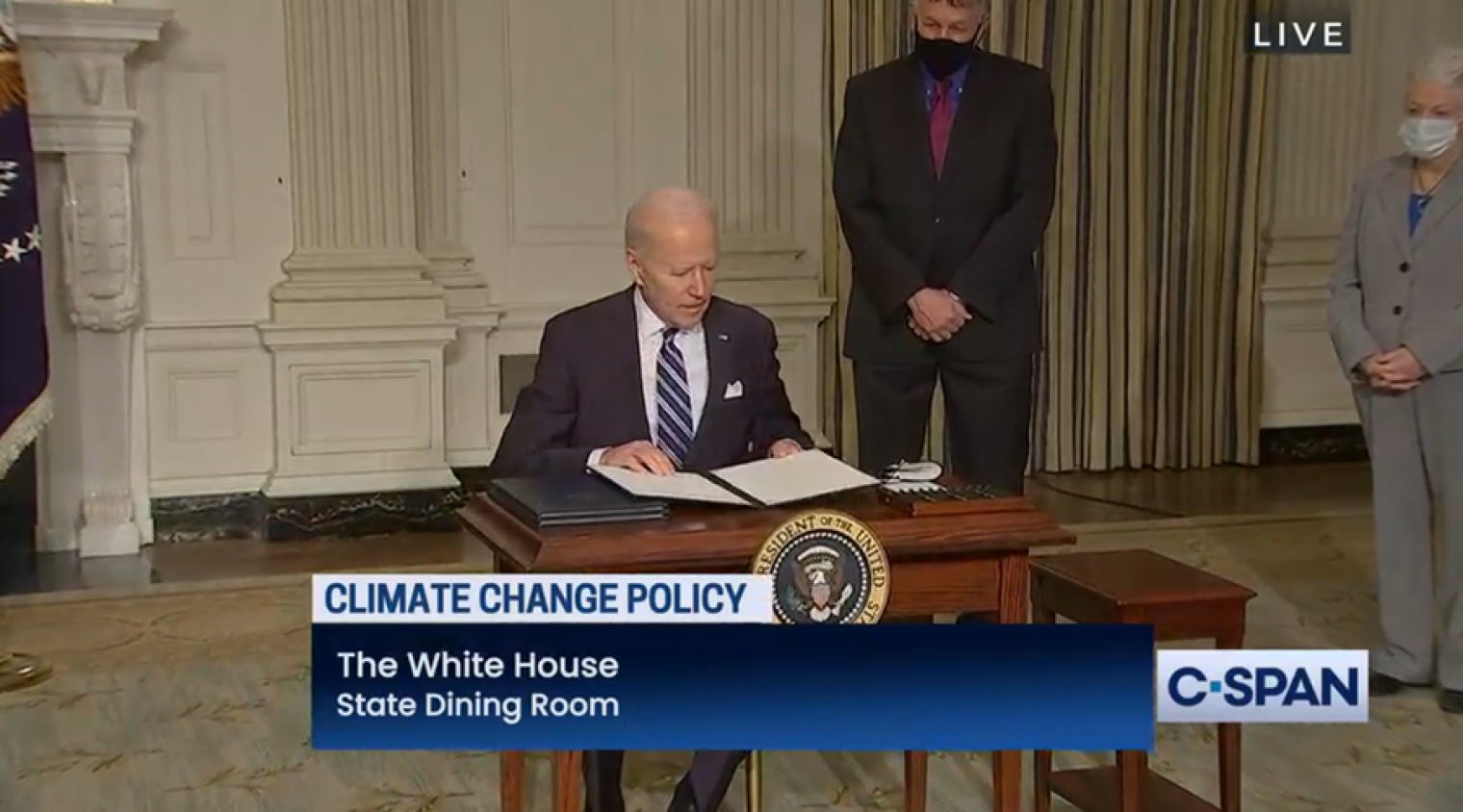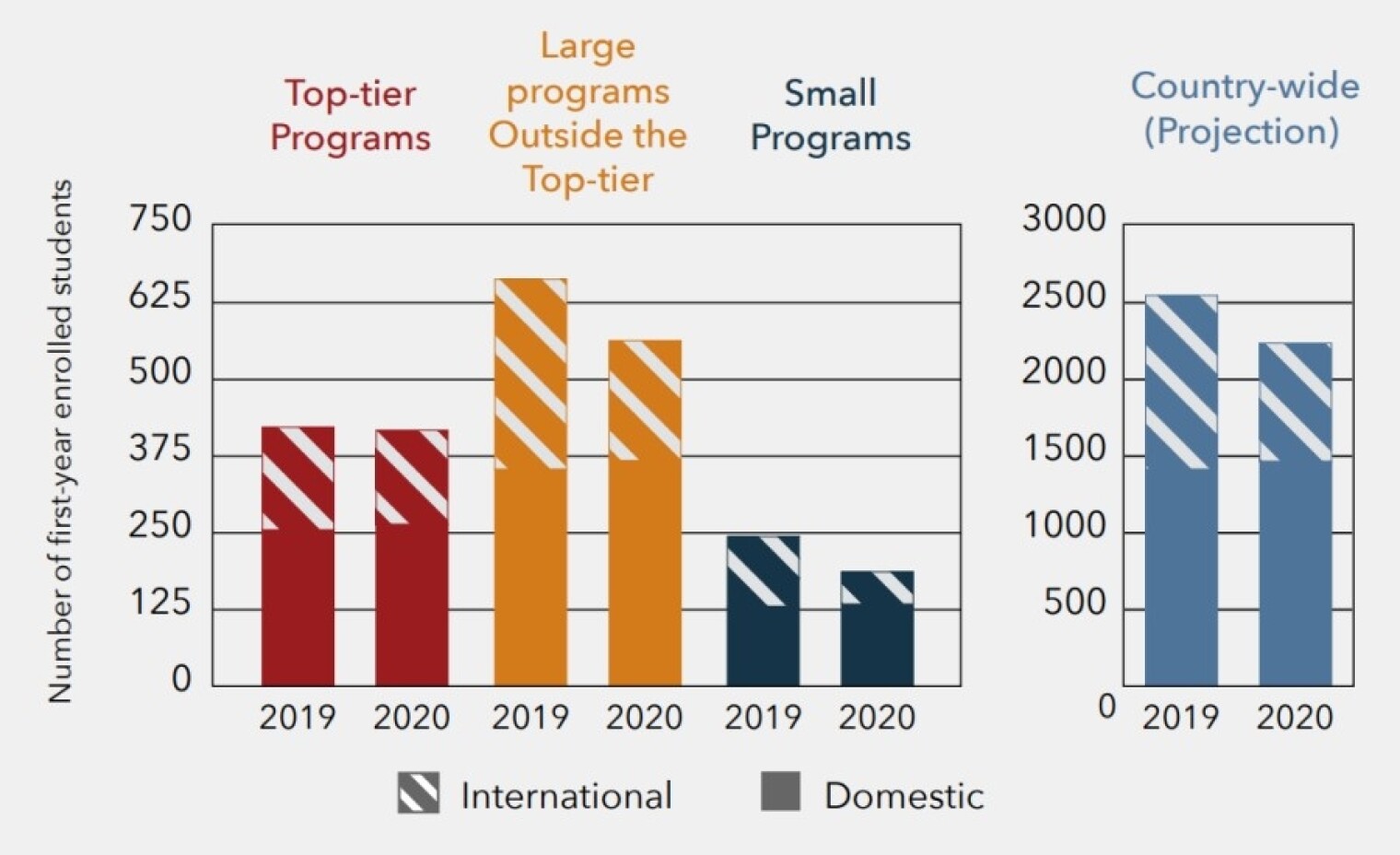| |
What’s Ahead
 |
| Image credit – Office of Sen. Joe Manchin (D-WV) |
Manchin Lines Up Hearing to Establish Climate Change ‘Baseline’
The Senate Energy and Natural Resources Committee is holding a hearing on Wednesday to “examine global climate trends and progress in addressing climate change.” At a hearing last week to review Jennifer Granholm’s nomination to be energy secretary, incoming Committee Chair Joe Manchin (D-WV) referred to the upcoming hearing as setting a “baseline” for future activity, remarking, “There are so many deniers out there of what’s going on around the world and whose fault it is. … Everybody should come to this committee with all the opinions they have and all the input, but we have to be working off the same baseline and the facts, and once we establish that, we think we can accomplish an awful lot.” Manchin went on to express concern about the implications of the “accelerating” transition away from fossil fuels for people employed by that industry in his state, and he argued that focusing on technological solutions is a way to move forward without leaving people behind. Last Congress, Manchin and Committee Chair Lisa Murkowski (R-AK) successfully shepherded a major bipartisan energy policy bill into law that places a strong emphasis on advancing carbon mitigation technology. Sen. John Barrasso (R-WY), an advocate for the fossil fuel and uranium interests in his state, is now rotating into Murkowski’s spot as the committee’s top Republican and he will likely be a key player in any new legislative efforts.
Energy and Commerce Secretary Nominees Poised to Advance
The nominations of former Michigan Gov. Jennifer Granholm (D) to be energy secretary and Rhode Island Gov. Gina Raimondo (D) to be commerce secretary are scheduled for votes on Wednesday by the Senate’s Energy and Natural Resources Committee and Commerce, Science, and Transportation Committee, respectively. Raimondo won bipartisan support at her nomination hearing last week, with incoming Committee Chair Maria Cantwell (D-WA) and incoming Ranking Member Roger Wicker (R-MS) each citing her experience in the public and private sectors. Granholm received an icier reception from incoming Energy and Natural Resources Ranking Member Sen. John Barrasso (R-WY), who probed her expressed interest in keeping fossil fuels “in the ground” and support as governor for a DOE technology grant to a battery company that later went bankrupt and was acquired by a Chinese firm. However, incoming Chair Joe Manchin (D-WV) praised Granholm and left no doubt he will support her confirmation. Consult FYI’s Federal Science Leadership Tracker to keep tabs on the progress of appointments to top jobs.
Study on Rapid Decarbonization Set for Release
The National Academies is hosting a briefing on Tuesday to mark the release of a study on the technology, policy, and social factors affecting the U.S.’ ability to rapidly decarbonize its economy. The report recommends near-term actions toward achieving net zero emissions by 2050, focusing in particular on ways to help communities most impacted by the transition, interactions between sectors, and policy coordination between local, state, and federal governments. It also identifies challenges and opportunities for technology R&D, especially in sectors that are difficult to decarbonize such as air travel. The study is intended to provide the foundation for a larger Academies initiative on “deep decarbonization.”
Physicists to Explore Challenges Facing Science and Society
The American Physical Society is hosting its annual leadership meeting on Thursday and Saturday. Panels at the event will focus on how university physics departments can be proactive in adapting to changing demographics and the economic fallout of COVID-19; organizational strategies to improve diversity, equity, and inclusion; and how scientists can communicate to nonscientists and “science-resistant communities.” The meeting will conclude with a panel on “Federal Policies to Strengthen Science in Service to the Nation,” featuring Rep. Bill Foster (D-IL), former House Science Committee Chair Bart Gordon (D-TN), Institute of Physics President Peter Knight, University of Maryland physicist Ellen Williams, National Science Foundation Director Sethuraman Panchanathan, and former NSF Director Neal Lane, who was also science advisor to President Clinton.
NIST Advisory Panel to Discuss Biden Priorities, NDAA
The principal advisory committee for the National Institute of Standards and Technology is meeting on Wednesday, with portions of the agenda dedicated to how the agency can contribute to the priorities of the Biden administration. The panel will also hear a presentation on relevant provisions of the latest National Defense Authorization Act, which was enacted in December. Notably, the legislation contains the CHIPS for America Act, which requires NIST’s parent department to subsidize the construction or refurbishment of semiconductor facilities in the U.S. and establish a public-private National Semiconductor Technology Center with participation from the National Science Foundation and the Departments of Defense and Energy. The act also directs NIST to create a program focused on improving semiconductor packaging as well as a new Manufacturing USA Institute dedicated to semiconductor R&D. Another major R&D bill included in the NDAA is the National Artificial Intelligence Initiative Act, which requires NIST to develop a “voluntary risk management framework for trustworthy artificial intelligence systems.”
‘Chemical Economy’ and Wildfire Chemistry Studies Launching
This week, the National Academies is kicking off a study that will examine the benefits of sustained support for fundamental chemistry research and how further investments could enhance the “chemical economy” in the U.S. The study is chaired by chemist Mark Wrighton, a professor and chancellor emeritus at Washington University in St. Louis, and is sponsored by the National Science Foundation, Department of Energy, National Institute of Standards and Technology, and the American Chemical Society. Representatives of each sponsor will discuss the study charge on Thursday, and the next day the committee will look at trends in federal support for academic chemistry, the structure of the chemical industry, and a related National Academies study on the “bioeconomy.” The National Academies is also launching a separate study this Friday on the “chemistry of urban wildfires” that will examine human exposure pathways for combustion products and recommend risk mitigation strategies. The study is sponsored by NIST, the National Institute of Environmental Health Sciences, and the Centers for Disease Control and Prevention.
#BlackInSciPol Week Kicks Off
The student-run National Science Policy Network is kicking off its Black History Month activities with #BlackInSciPol, a weeklong social media celebration of Black members of the science policy community. The initiative is the latest in a series of #BlackInX social media events, such as #BlackInPhysics, which have all worked to highlight the work of Black students and professionals in various STEM disciplines. Throughout the week, the organizers will spotlight Black science policy scholars and professionals, and on Thursday NSPN is hosting a happy hour. Events later in the month will include virtual tours of Historically Black Colleges and Universities and events centered on Afrofuturism, including a panel discussion on its relevance to science policy.
|
|
In Case You Missed It
 |
| President Biden signs executive orders on climate change and scientific integrity. Behind Biden are National Climate Advisor Gina McCarthy, right, and his science advisor, Eric Lander. (Image credit – C-SPAN) |
Biden Issues Order to Reinforce Scientific Integrity Policies
President Biden signed a memorandum on Jan. 27 aimed at bolstering scientific integrity policies across agencies, building on Obama-era scientific integrity policies and the Foundations for Evidence-Based Policymaking Act of 2018. The memo assigns the director of the White House Office of Science and Technology Policy primary responsibility for scientific integrity across the government and it places a particular emphasis on preventing “improper political interference,” principally through a new interagency task force that will identify instances where scientific integrity policy violations have led to “suppression or distortion” of data and findings. The task force is directed to complete its review within 120 days and then produce a framework for “regular assessment and iterative improvement” of policies in place. The memo also requires science agencies to designate a “chief science officer” and all agencies to designate a separate “scientific integrity official” to monitor the implementation and improvement of these policies.
Administration’s Climate Change Response Takes Shape
Alongside the scientific integrity memorandum, Biden signed an executive order that creates a government-wide framework for responding to the “climate crisis.” The order creates a White House Office of Domestic Climate Policy and an interagency National Climate Task Force, both led by National Climate Advisor Gina McCarthy, and identifies climate considerations as an “essential element” of U.S. foreign policy and national security. Among its more specific provisions, the order mandates a National Intelligence Estimate on the security implications of climate change, kicks off the process of developing the U.S. “nationally determined contribution” to meeting the Paris Agreement emission reduction targets, pauses new oil and natural gas leases on public lands, requires federal agencies to plan to procure zero-emission vehicles, and directs agencies to eliminate fossil fuel subsidies and prioritize clean energy R&D in their fiscal year 2022 budget requests.
Senators Air Array of Science Policy Concerns at Hearing
During last week’s hearing to consider the nomination of Rhode Island Gov. Gina Raimondo (D) to be commerce secretary, members of the Senate Commerce, Science, and Transportation Committee asked about a wide variety of science policy issues. While Raimondo’s answers were generally cautious, the senators’ interest in these matters could foreshadow further attention in the future:
- Incoming Committee Chair Maria Cantwell (D-WA) asked about the integrity of government data, the impact of ocean noise on orca populations, the competitiveness of U.S. weather forecasting models, and the anticipated interference of 5G telecommunications equipment with weather observations in adjacent spectrum bands.
- Incoming Ranking Member Roger Wicker (R-MS) and Sens. John Thune (R-SD) and Marsha Blackburn (R-TN) likewise expressed interest in issues concerning the allocation of spectrum for public and private uses.
- Thune also asked about the National Oceanic and Atmospheric Administration’s efforts to open U.S. weather models to contributions from outsiders, noting his interest in advancing legislation on the subject.
- Sens. Deb Fischer (R-NE) and Kyrsten Sinema (D-AZ) each expressed support for NOAA’s activities to monitor and respond to drought conditions.
- Sen. Tammy Baldwin (D-WI) criticized the National Institute of Standards and Technology’s recent proposal to explicitly limit the government’s ability to exercise “march-in” rights on patents arising from research it has funded.
- Sen. Jerry Moran (R-KS) stated that the backlog of infrastructure recapitalization at NOAA and NIST is at a “crisis” level, which is a matter under his jurisdiction as the incoming ranking member of the Senate’s appropriations subcommittee for the agencies.
- Sinema expressed interest in pressing ahead with the microelectronics initiative Congress authorized in December.
- Sen. Todd Young (R-IN) asked about the Endless Frontier Act, an ambitious R&D proposal he cosponsored last Congress, and about competing technologically with China more generally. Sen. Fischer also asked about promoting U.S. competitiveness in emerging technologies.
- Sen. Ted Cruz (R-TX) asked about the Commerce Department’s use of export and import controls to protect U.S. technologies from exploitation by the Chinese government.
- Sens. Brian Schatz (D-HI), Ed Markey (D-MA), Baldwin, and Cantwell all asked about efforts to understand climate change, analyze climate-related risks, and improve climate resilience. Schatz also encouraged Raimondo to strengthen the scientific integrity policies under her jurisdiction.
House Names Lead Appropriators for Science Agencies
Congressional committees have begun to announce leadership assignments for the 117th Congress, with the House Appropriations Committee among the first to name its full slate of subcommittee leaders. While there are no changes of note on the Republican side, the Democrats have announced new leaders for several subcommittees that write spending legislation for science agencies. Rep. Matt Cartwright (D-PA) is now the lead House appropriator for NASA, the National Science Foundation, National Oceanic and Atmospheric Administration, and National Institute of Standards and Technology, replacing Rep. José Serrano (D-NY), who retired at the end of the last Congress. Rep. Chellie Pingree (D-ME) will take over as chair of the Interior-Environment Subcommittee from Rep. Betty McCollum (D-MN), who will now chair the Defense Subcommittee. The Republicans on the House Science Committee also announced their members last week, though not subcommittee leadership assignments. Check the FYI Federal Science Leadership Tracker for updates on congressional committee assignments.
Kim Budil Picked as Livermore Lab Director
Lawrence Livermore National Laboratory announced last week that physicist Kim Budil will take over as its director on March 2, becoming the first woman to lead the lab since its establishment in 1952. Budil first joined the lab in 1987 as a graduate student in its laser program and later served in a variety of management roles before departing in 2014 to become vice president for national laboratories at the University of California. She rejoined the lab in 2019 to lead its nuclear stockpile stewardship portfolio. Livermore Lab has expanded significantly in recent years as part of a push to modernize the U.S. nuclear weapons enterprise and hired more than 1,400 employees in 2020.
APS Identifies Challenges Facing US STEM Workforce
 |
| Results of an APS survey on first-year enrollments of international students in physics doctoral programs in the U.S. (Image credit – APS) |
The American Physical Society published a report on Jan. 22 that argues the U.S. risks ceding global leadership in science and technology if it does not take immediate action to bolster the capacity of its domestic STEM workforce and attract more scholars from abroad. Based on a survey of 79 doctorate-granting physics departments, APS found that those at schools outside the top tier faced steep international enrollment declines for 2020. It estimates that nationally this amounts to approximately 360 fewer first-year international doctoral students in physics compared to 2019, representing about 10% of the total first-year cohort of doctoral physics students. The report attributes the decline in part to restrictive visa policies and recommends the U.S. make it easier for international STEM students to remain in the country after graduation. On challenges facing the domestic workforce, APS identifies an “urgent shortage” of STEM teachers, noting that as of 2011 only about a third of high school physics teachers had a major or minor in the subject or were certified to teach it. APS also stresses that the universities that train a majority of students from underrepresented groups receive a relatively small share of federal R&D funding, leaving these students with diminished opportunities to engage in research. Among other remedies, the report calls on federal agencies to expand support for STEM teacher preparation programs and to incentivize top universities to partner with minority-serving institutions to increase their research capacity. (APS is an AIP Member Society.)
|
|
Events This Week Monday, February 1
Tuesday, February 2
Wednesday, February 3
Thursday, February 4
Friday, February 5
Saturday, February 6
Monday, February 8
|
|
Opportunities DOE Seeking Input on Accelerator Technology
The Department of Energy has issued a request for information on the state of the market for particle accelerator technologies, including opportunities for strengthening the domestic supply chain. DOE observes that “reductions in federally funded long-term accelerator R&D over the past decade, coupled with marginal domestic markets for accelerator technologies have resulted in weakening of the domestic accelerator technology production capability.” Submissions are due March 15.
NSF Hiring Astronomy Division Director
The National Science Foundation is accepting applications for the director position in its Astronomical Sciences Division, responsible for overseeing the agency’s large portfolio of ground-based observatories. Applicants must have a doctorate in astronomical sciences or a closely related field and demonstrate broad understanding of university research and grant administration. Applications are due April 16.
Day One Project Accepting S&T Policy Ideas
The Day One Project, an initiative to identify science and technology policy proposals for the new presidential administration, is continuing to accept submissions on a rolling basis. The project is also accepting input on its initial list of the “top 150” S&T leadership roles across the U.S. government.
Know of an upcoming science policy event either inside or outside the Beltway? Email us at fyi@aip.org.
|
|
Around the Web
News and views currently in circulation. Links do not imply endorsement.
White House
Congress
Science, Society, and the Economy
Education and Workforce
Research Management
Labs and Facilities
Emerging Technologies
Space
Weather, Climate, and Environment
Energy
Defense
Biomedical
International Affairs
- Former Google CEO and others call for US-China tech ‘bifurcation’ (Axios)
- America needs a new international strategy for science, technology, and innovation (Issues in Science and Technology, perspective by David Cheney, et al.)
- State Department should use data and evidence to justify its proposal for a new Bureau of Cyberspace Security and Emerging Technologies (GAO, report)
- Is China a global leader in R&D? (CSIS)
- US government acts to reduce dependence on China for rare-earth magnets (Physics Today)
- Chip industry group urges Biden administration to review export controls on China (Reuters)
- Myths and realities of China’s military-civil fusion strategy (CNAS, report)
- The conflict with Chinese techno-nationalism isn’t coming — it’s already here (War on the Rocks, perspective by James Mulvenon)
- G7 urged to take ‘allied action’ against China on AI, quantum, and 5G (Science|Business)
- WHO in Wuhan is probing COVID’s origins as politics hangs over mission (NBC News)
- Hong Kong researchers wary of mainland control as Xi Jinping pushes ‘more openness’ on science (Research Professional)
- Horizon Europe draft work programs leak online (Science|Business)
- Horizon Europe research calls to support a digital and green transition detailed in leaked drafts (Science|Business)
- UK physicists begin life outside the EU — but remain in Horizon Europe (Physics World)
- Alberta province paid $28,000 for a report smearing hundreds of climate journalists (Vice)
|
|
|
| |
| |
|
